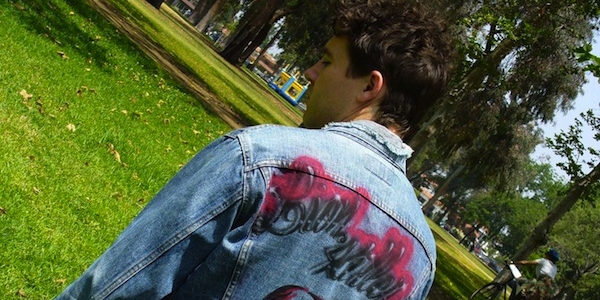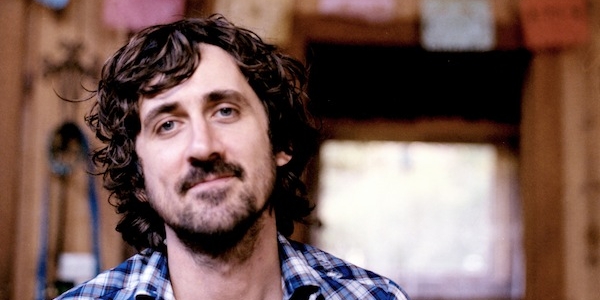Which makes the fact of this phone interview seem nigh on miraculous. Speaking from New York City before his upcoming Australian tour, McCombs is careful in his responses – occasionally veering into playful irony, having supposedly spent his day “painting my face, taking my clothes off, getting high” – with an innocuous inquiry into musical influences eliciting a typically reticent reply: “I’ve never really been big on talking about other music. I have my heroes, but… I’d say my music is more influenced by my friends and my family and the world around me than it is by anybody else’s music. My music is about my music, not about anybody’s else’s music.”
As even a cursory listen will attest, that music is as unusual, moving and deliberate as anything in modern pop, managing that rare trick of seeming at once spontaneous as well as exquisitely wrought. McCombs’ contradictory propensities were perhaps most finely balanced on third album Dropping The Writ (2008), with songs like ‘That’s That’ or the gorgeous ‘Petrified Forest’ containing both wry melancholy and gentle humour; harmonic minimalism and textural complexity; inertia and endlessly unfolding motion. These divergent tendencies were isolated to superb effect in last year’s dual releases, the sublimely bleak WIT’S END being followed six months later by the more comfortably mellow Humor Risk.
Lyrically McCombs deals in fleeting sketches, related in language that seems to strive towards both the revelatory and the mundane, the stories emerging through an accumulation of gesture rather than through any overt narrative. “I’m just constantly trying to find, not necessarily stories, but ideas that make my skin crawl, that give me a chemical reaction,” he says. “Political ideas, erotic ideas, devious ideas. I’ll let all the other bands write the happy-go-lucky safety songs. I like being the guy who takes care of the compost pile.
“The first thing I want to be with my writing is spontaneous. I need to have the ability to just write something with energy, that’s not calculated – that’s just blurted out, the first thing that comes to mind. But on the other hand you want to have down time where you’re not writing, you’re just listening and collecting what other people say; you want to do them justice. I don’t really have a technique other than to keep it chaotic.”
Although he expresses an extreme disdain for the recording process (“I hate bands that have ‘a sound’. I’m totally opposed to the commodification of music and that’s what recordings are: they’re commodities, they isolate a song … so you can’t really imagine it otherwise”), McCombs’ most recent recorded work is particularly immaculate, comprised of carefully varied arrangements straining towards a musical apotheosis within the strict confines of the song: the meandering bass clarinet that closes Memory’s Stain springs to mind, or the mannered harpsichord of Buried Alive. But McCombs doesn’t care to claim sole credit, recognising the important contributions of the rotating cavalcade of musicians who’ve taken up with him. “We try to make it as collaborative as we can. That’s why we call it the Cass McCombs Band, [it’s] not just me up there,” he says. “Everyone has a stake in it, and when we’re on stage everyone is equal. We do a lot of improvisation and everyone is very accomplished in their skills… It’s a pretty good platoon we have here.”
Though at the time of writing he had “yet to buy the plane tickets”, Australian audiences’ first taste of Cass McCombs’ live show seems likely to be an interesting one. “When you perform, anything can happen,” he says. “When I go to see shows, I go with zero expectations. I want to feel violated. So that’s what I try to do when I perform: try to violate people … I think people want to see a disaster. They don’t want the big, strong, confident superhero up there, they want a fucking spectacle … What I look for at a performance is energy: chaos and violence and creation and movement. I don’t want something that’s canned.”
Pre-packaged is the last thing McCombs could be accused of. His work remains elusively uncategorisable, slipping between the generic cracks; it reflects the questing restlessness and dissatisfaction with any fixed certainty that characterise its creator. Indeed, his songs seem pervaded by the sense that music is one means by which Cass McCombs has found of obliterating the nagging selfishness of the individual ego. “To put on a mask is to transform oneself, you mutate your soul. You become a shape-changer. I think songs have that ability. What I want is to have a wide range of abilities. I want my life to be like a deck of cards that’s spread out all over the place. I don’t want to be nailed down to any one gender or political perspective or anything. I want to be able to change as I find suitable.”
BY OLIVER DOWNES







